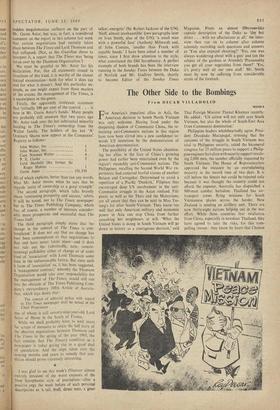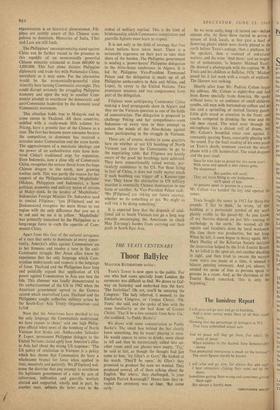The Other Side to the Bombings
From OSCAR VILLADOLID
MANILA
LIOR America's impatient allies in Asia, the
American decision to bomb North Vietnam was only welcome. Having lived under the deepening shadow of Communist China, the re- maining anti-Communist nations in this region have now been stirred into a new confidence to- wards U$ intentions by the demonstration of American determination.
The possibility of the United States abandon- ing her allies in the face of China's growing power had earlier been entertained even by the region's staunchly anti-Communist nations. The Philippines, recalling the Second World War ex- periences, had conjured fearful visions of another Bataan and Corregidor. Determined to avoid a repetition of a .Pacific 'Dunkirk,' Filipinos thus encouraged deep US involvement in the anti- Communist struggle in the Asian rimland. Fili- pinos, as well as the Thais and the Malaysians, are all aware that they can be next in Mao Tse- tung's list after South Vietnam. They know too well that only American military and economic power in Asia can stop China from further assaulting her neighbours at will. 'What the United States is doing in South Vietnam will go down in history as a courageous decision,' said Thai Foreign Minister Thanat Khoman recently. He added: 'US action will not only save South Vietnam, but also the whole of South-East Asia from Communist domination.'
Philippine leaders wholeheartedly agree. Presi- dent Diosdado Macapagal, stressing that the outcome of the struggle in South Vietnam was vital to Philippine security, asked the bicameral congress for 25 million pesos to support a Philip- pine engineer battalion with security support involv- ing 2,000 men, the number officially requested by South Vietnam. The House of Representatives approved the measure by an overwhelming majority in the record time of two days. It is still before the Senate but could be rejected only because it was thought the country could not afford the expense. Australia has dispatched a 900-man combat battalion. Thailand has air- transport crews flying missions for South Vietnamese planes across the border. New Zealand is sending an artillery unit. There are now thirty-eight nations helping out in the war effort. While these countries fear retaliation from China, especially in nextdoor Thailand, they have agreed to take the risks, for this com- pelling reason: they know by heart that Chinese .expansionism is an historical phenomenon. Fili- pinos are acutely aware of this Chinese com- pulsion to dominate. Memories of India, Tibet and Laos are still fresh.
The Philippines' uncompromising stand against China can be further traced to the presence in this republic of an economically powerful Chinese minority estimated at from 600,000 to 1,000,000. This fact alone dictates Philippine diplomatic and trade ties with Nationalist China, unrealistic as it may seem. For the alternative would be the economically-powerful alien minority here turning Communist overnight. This could disrupt seriously the struggling Philippine economy and open the way to another Com- munist attempt to overthrow the democratic and anti-Communist leadership by the dormant local Communist movement.
This situation holds true in Malaysia and to some extent in Thailand. All these countries, saddled with a ready-made fifth column for Peking, have a genuine fear of the Chinese as a race. The fear has become more awesome because the compulsion to dominate has received a stimulus under Communism and the atom bomb. The aggressiveness of a messianic ideology and the power of an authoritarian state have bols- ' tered China's traditional urge for expansion. Even Indonesia, now a close ally of Communist China, recognises the serious threat from the huge Chinese dragon to the north, now growing nuclear teeth. This was partly the reason for her support of the Philippine-initiated Naphilindo' (Malaya, Philippines and Indonesia), a loose political, economic and military union of nations of Malay stock. In the heyday of `Maphilindo,' Indonesian Foreign Minister Dr. Subandrio used to remind Filipinos: 'you [Filipinos] and we [Indonesians] recognise the main threat to our region with the only difference that you see it in red and we see it in yellow.' Maphilindo' was primarily conceived by the Philippines as a long-range force to curb the appetite of Com- munist China.
Apart- from this fear of the cultural arrogance of a race that seeks to dominate at every oppor- tunity, America's allies against Communism see in her firmness and resolve a turn in the anti- Communist struggle. Her Asian allies know by experience that the only language which Com- munism understands and respects is the language of force. Thailand and the Philippines have long and painfully argued that application of US power against Communism in Asia can turn the tide. This clamour was loudly demonstrated to the embarrassment of the US in 1962 when the American government agreed to the Geneva accord which neutralised Laos. Thailand and the Philippines sought collective military action by the South-East Asia Treaty Organisation—and failed.
'Now that the Americans have decided to use the only language the Communists understand, we have reason to cheer,' said one high Philip- pine official when news of the bombing of North Vietnam first broke out. Ambassador Salvador P. Lopez, permanent Philippine delegate to the United Nations, stated aptly how America's allies in Asia feel about the strong US response: The US policy of retaliation in Vietnam is a policy which has shown that Communists do have a wholesome tespect for force when applied in time, massively and patiently. We [Filipinos] wel- come the doctrine that any attempt to overthrow the legitimate government of a state by acts of subversion, infiltration and guerrilla warfare abetted and supported, wholly and in part, by another state, subjects the latter state to the
ordeal of military reprisal. This is the kind of brinkmanship which Communist conspirators and guerrilla fighters must learn to respect.'
It is not only in the field of strategy that free Asian nations have taken heart. There is a noticeable eagerness on their part to take their share of the burden. The Philippine government is sending a 'power-house' Philippine delegation to the Afro-Asian conference in Algiers. It is led by Philippine Vice-President Emmanuel Pelaez and the delegation is made up of all Philippine ambassadors to Asia and Africa, and Lopez, its envoy to the United Nations. Two prominent senators and two congressmen form part of the delegation.
Filipinos were anticipating Communist China making a loud propaganda show in Algiers and they see the Vietnam question as one of the fields of concentration. The delegation is prepared to challenge Peking and her sympathisers—even Indonesia—at every turn in their attempt to poison the minds of the Afro-Asians against those participating in the struggle in Vietnam.
There-are, of course, doubts in some quarters here on whether or not US bombing of North Vietnam can force the Communists to go to the negotiating table. But Filipinos are keenly aware of the good the bombings have achieved. They have unquestionably raised morale, par- ticularly confidence in the US. For those living in fear of China, it does not really matter much if each bombing can trigger off a Korean-type war. They know the alternative to US military inaction is eventually Chinese domination in one form or another. As Vice-President Pelaez said: 'We [Filipinos] are risking our future anyway, whether we do something or not. We might as well risk it by doing something.'
It is expected here that the dispatch of addi- tional aid to South Vietnam can go a long way towards encouraging the Americans to check Mao Tse-tung's hordes from carrying out their goals in South-East Asia.







































 Previous page
Previous page